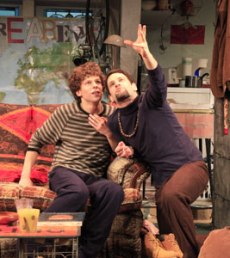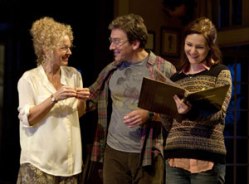Category: "Off-Broadway"
Review: Burning
Nov 15th

Thomas Bradshaw’s new play Burning is playing at the New Group’s theater on 42nd Street, but it would have been right at home on the old 42nd Street as well. This sprawling, ambitious tale set in the worlds of art and theater features enough graphic sexual couplings and full-frontal nudity to satisfy any voyeur—even its poster, featuring a close of a derriere, seems tailor-made for the porn crowd.
The playwright, a theatrical provocateur who has won acclaim for such works as Southern Promises and The Bereaved, has previously demonstrated a far more minimalist style than he exhibits here. Running 2 and 3/4 hours and featuring a dozen or so characters, this work set in two distinct eras is practically Tony Kushnerian in its scope.
Unfortunately, Bradshaw doesn’t seem to have Kushner’s ability to juggle so many balls in the air at once. It’s impossible to gauge what he was trying for with this effort, which shifts wildly in tone and seems to border on satire without quite getting there.
The overlong evening features two intertwined storylines. In one set in the present day, Peter (Stephen Tyrone Williams), a black artist, travels to Berlin to participate in a major gallery show, only to run afoul of a neo-Nazi (Drew Hildebrand). In the other, set in the 1980s, Chris, (Evan Johnson), an orphaned teen, travels to New York, where he is taken in by a gay couple (Andrew Garman, Danny Mastrogiorgio) who work in the theater. He soon begins an affair with a playwright (Vladimir Versailles) with whom his caretakers are collaborating, with predictably emotionally messy results.
That brief description doesn’t begin to do justice to the many twists and turns of the labyrinth-like plot, which is positively baroque in its excesses. It mainly seems an excuse for a series of graphic sex scenes--of both the heterosexual and homosexual variety--including Peter’s life-changing encounter with a black prostitute (Barrett Doss) and the neo-Nazi incestuously helping his crippled sister (Reyna de Courcy) achieve a “release.”
Is all of this meant to be funny? It’s hard to say. Certainly it produced a lot of nervous titters from the audience, who were apparently not used to seeing such actors as Hunter Foster (Urinetown, Little Shop of Horrors) on the receiving end of anal intercourse.
It’s all staged with gusto by director Scott Elliott, the New Group’s artistic director, who clearly doesn’t shy away from this sort of confrontational, in-your-face theater. He’s certainly elicited highly committed, fearless performances from the ensemble, who frequently bare all for the sake of their art.
The playwright clearly has a lot of things on his mind, with no shortage of provocative themes on display. The politics of sex, art and race are all dealt with in one way or another, entertainingly if only superficially. But by the time the overlong work reaches its truly absurd conclusion—I won’t even hint at it, it has to be seen to be believed—it’s long become clear that Bradshaw has wildly overreached.
The New Group@Theatre Row, 410 W. 42nd St. 212-239-6200. www.telecharge.com
Review: Sons of the Prophet
Nov 7th

Santino Fontana continues to emerge as one of the great talents of the New York stage in Sons of the Prophet, the latest confident from Stephen Karam. As some might remember, it was another Karam work, Speech and Debate, that inaugurated the Roundabout Underground four seasons ago. And so Prophet, which runs at the Roundabout main stage space the Laura Pels Theatre, represents the continued growth of two forces attached to the show: its leading actor and its very creator.
Prophet is a cluttered play that never quite moves in the linear ways we expect it to, charting as it does a period of epic change in the life of 29-year-old Joseph Douaihy (Fontana), who, like Karam himself, is a Pennsylvania-bred gay man of Lebanese descent. Hopefully unlike Karam, however, is the series of Job-like trials Joseph finds himself enduring.
An erstwhile runner with the potential to compete at the Olympics, Joseph has begun to experience an inflammation in his knees and additional symptoms that defy easy medical classification. Far worse, his father has passed away due to a heart attack that may or may not have been caused by a car accident when he drove into a deer decoy planted as a prank. This forces a change in his family dynamic once his ailing uncle Bill (Yusef Bulos) decides to move in with Joseph and his younger, also gay, brother Charles (Chris Perfetti).
Other complications ensue when Joseph meets and falls for a handsome news reporter, Timothy (Charles Socarides), covering the fallout from the deer accident. At the same time, the Douaihys are conflicted over the proper way to punish Vin, (Jonathan Louis Dent), the high school football star responsible for it. And Gloria (Joanna Gleason), Joseph’s seemingly absent-minded publishing boss, keeps pressing him to turn his Maronite family’s history into book fodder.
Karam demonstrates a keen understanding of both pain and suffering, and the difference between the two – that as awful as pain may be, whether it be physical or emotional, it’s easier to deal with hurt that can be explained than that which lingers without explanation or even the promise of relief. Prophet’s characters are all woeful in their own way. Even Gloria and Vin are haunted by ghosts of their damaged pasts. Director Peter DuBois reins in all of these story arcs with the right balance of sensitivity and a humor that borders, but never trespasses, on the absurd. The show recognizes that comedy can emerge in the most serious of moments, and how even the tensest of situations can eventually feel banal. Take, for example, a scene in which Joseph and Charles fight following the former’s spinal tap. Or an ongoing funny-sad gag in which Uncle Bill must leave the door open while using the toilet.
The playwright achieves this by couching Prophet as a reinterpretation of Khalil Gibran’s massive seller, The Prophet. Superscripts create chapters for Joseph’s journey based on the book, such as “On Pain,” “On Friendship,” and “On Reason & Passion.” Karam has a lot on his plate, but the crowded play is never clumsy. He examines every aspect of Joseph’s torment, recognizing that the people in his life who frustrate him the most are also the ones that might offer the most succor. (The character of Gloria, is the only one that times borders on caricature.)
As such, the acting in Prophet is uniformly terrific (Lizbeth Mackay and Dee Nelson offer solid work in a series of supporting roles). What is most curious is how several of these actors – Bulos, Gleason, Socarides – are able to communicate so much about their characters while still keeping secrets about their motivations. Fontana, on the other hand, bares Joseph’s scared, weary soul in a performance that doesn’t have a false note and calls no unnecessary attention to the many small but essential strokes of genius that the performer utilizes to bring this subtle, distinctive character to life.
Unlike the mysterious malady that plagues Joseph, it’s all too easy to trace the source of Prophet’s searing glory: the clever Karam. One is hopeful that it is not long before his symptoms appear yet again in some form on the stage.
----- Doug Strassler
Laura Pels Theatre, 111 West 46th Street, 212-719-1300. www.roundabouttheatre.org
Review: Asuncion
Nov 3rd

Jesse Eisenberg certainly hasn’t written an attractive part for himself in his debuting playwriting effort, now being presented by the Rattlestick Playwrights Theater. In his dark comedy Asuncion, the Oscar-nominated star of The Social Network plays Edgar, a journalistic blogger whose reformist ideals are undercut by his clueless political correctness. The sort of spineless twerp who excuses the youths who keep mugging him because of their lower social standing, he also continually debases himself in his strange, sadomasochistic relationship with his roommate Vinny (Justin Bartha).
Vinny, working for a PhD in Black Studies, is a carefree, pot-smoking ne’er do well who likes to hang out in his bathrobe and bang out rhythms on his bongo drums. But he also displays a truly nasty side, particularly towards Vinny, who seems to be in sexual thrall to him.
The two men find their lives uprooted by the arrival of Edgar’s successful older brother Stuart (Remy Auberjonois) and his beautiful new Filipino bride Asuncion (Camille Mana). Stuart asks that the pair babysit Asuncion for a few days while he takes care of some mysterious business. In one of the play’s more contrived plot elements, he apparently feels that the duo’s messy bachelor pad apartment is the perfect hiding place.
Vinny is delighted by the new arrival, but Edgar, hearing that his brother met Asuncion on the Internet, assumes that she is either a sex slave or mail order bride, and determines to interview her for what he feels will be his journalistic breakthrough.
Eisenberg has some interesting ideas to express here about cultural clashes and underlying prejudices, and he also displays a knack for crafting sharply funny one-liners. But he’s less successful in terms of dramatic structure and narrative credibility, with the result that the play never successfully coheres, wandering off in too many disparate directions.
Still, under the breezy direction of Kip Fagan the evening is quite entertaining, with both Eisenberg and Bartha delivering terrifically amusing performances. The latter in particular is a droll delight, investing his portrayal with enough daffy physical humor to suggest that he’s been wasted in the hugely successful Hangover movies. Mana is charming as the fun-loving Asuncion, and Auberjonois is suitably smarmy as the condescending brother.
Cherry Lane Theatre, 38 Commerce St. 212-352-3101. www.Rattlestick.org.
Review: We Live Here
Nov 3rd

I don’t envy actress-turned-emerging-playwright Zoe Kazan; it’s hard to write a family play that steers clear of the usual tropes of long-simmering resentment and buried history. Her second work, We Live Here, arrives at Manhattan Theatre Club’s City Center space in the estimable hands of director Sam Gold, but at the end of the day, Kazan’s plays feels all too familiar, which, yes, breeds contempt.
The play’s contrived premise finds Allie Bateman (Jessica Collins) rushing into a wedding with her painter fiancé Sandy (Jeremy Shamos) a mere six months after first meeting him. (For unexplained reasons, the two have waited to consummate their union). College-age younger sister Dinah (Betty Gilpin, a bundle of jittery nerves here) returns from New York to the New England home of parents Lawrence and Maggie (Mark Blum and Amy Irving) for the wedding. It’s the first time that she will have met Sandy as well as told her parents that she is dating Daniel (Oscar Isaac), a revelation that is a bombshell not just because he is more than a decade Dinah’s senior but because he also dated Annie, Allie’s twin who died when she was a teenager and Dinah a very young girl.
We Live Here’s first act makes for an adroit, if dramatically inert setup, as we wait to see the ripple effect Daniel’s re-entry causes. Gold, who in delicate works like Circle Mirror Transformation and Kin has managed to mine harrowing material out of even the most mundane of circumstances and bring the interior to electrifying life, creates a convincing family portrait. The Bateman’s connections feel real, and even more so, John Lee Beatty’s wonderful set creates the sense of a truly lived-in home rather than a merely polished set. And Kazan has a feel for authentic, thoughtful adult dialogue (We Live Here is the first play in which I have ever seen a character use the word “sanguine” both correctly and appropriately).
But the payoff is ultimately minimal, as Kazan cheapens We Live Here’s rich potential in a second act that offers a useless flashback, turns the character of Daniel into a cliché, and, most of all, offers some condescending armchair psychology on the concept of loss. Instead of sharp observations, the plot detours into lazy convention and an unsubtle ending that even Gold cannot manage to make organic. As a result, the show manages to be both portentous and pretentious.
Collins does admirable work showing how the loss of her twin still reverberates within Allie; it doesn’t take much to provoke her in ways that cause her to lash out at her loved ones. But because she is playing a character significantly younger (and, likely, less self-aware) than herself, Gilpin’s portrayal calls too much attention to itself to feel authentic. Irving, whose hoarse voice is ill-equipped for the City Center stage, is also unable to dig beneath her two-dimensional role to find the grace notes that would humanize the paralyzed ice queen that is Maggie.
Gold gets more solid work from two of the male members of the We Live Here cast, who provide insight into their characters; inner worlds without feeling forced to project them sky high. Shamos makes the sensitive Sandy, whose father abandoned him at a young age, a nice contrast to the unstable Bateman clan. And Blum manages to transform an academic lecture into look at his own mentality. Kazan’s eagerness to turn Daniel into a cipher, however, makes Isaac at a loss to justify much of his character.
In choosing to chart family ties, it would seem that Kazan has unfortunately bound herself too tight.
----- Doug Strassler
Manhattan Theatre Club City Center, 131 W. 55th St., 212-581-1212. www.nycitycenter.org
Review: The Agony and the Ecstasy of Steve Jobs
Oct 18th

The recent death of Steve Jobs provides a fascinating conundrum for Mike Daisey, the writer/performer of the solo piece The Agony and the Ecstasy of Steve Jobs. On the one hand, it provides an added level of discomfort, since the monologue is not exactly complimentary to its subject. On the other, it makes the show feels breathtakingly refreshing in the light of the pervasive hagiography that has occurred in recent weeks.
By now, Daisey has proven himself to be a master monologist and a worthy successor to the late, great Spalding Gray. Although all of his pieces have a highly personal aspect, he’s far less self-reflective than his predecessor, and this latest effort demonstrates yet again his talent for delivering incisive explorations of serious political and social themes while at the same being consistently hilarious.
In this two-hour presentation, he interweaves an account of Jobs’ life and career as one of the most influential figures in modern business and technology with a hard-hitting expose of the horrific conditions under which Apple’s—and most other company’s--high-tech products are made.
Labeling himself as an “Apple aficionado” who has long been a “worshipper at the cult of Mac,” Daisey delivers a compelling biographical portrait of Jobs in which he describes him as both “a visionary and an asshole.”
But it’s his description of a trip taken to Shenzhen, China--where there are massive factories in which Apple’s devices are manufactured--that is the evening’s most compelling element. Posing as a wealthy businessman, he managed to get a tour of one such mega-factory, Foxxconn. To give an idea of its scale, he challenges the audience to imagine a cafeteria that can accommodate 10,000 workers, and then take in the fact that the factory contains fifty such cafeterias.
He movingly relates his secret interviews with workers who are just twelve and thirteen years old and another whose hands have been reduced to virtual claws as a result of the repetitive movements his job required. He showed the latter his iPad, which the man had never seen in operation despite the fact that he had been assembling them for months.
Although Daisey’s message is deadly serious, the piece never turns ponderous, thanks to his masterful comic technique. Whether describing the horrors of Powerpoint presentations, imitating the ungodly screech of a dot matrix printer, or relating his own obsession with Apple products, he provides belly laughs that make the evening as entertaining as it is thoughtful.
Public Theater, 425 Lafayette St. 212-967-7555. www.publictheater.org.